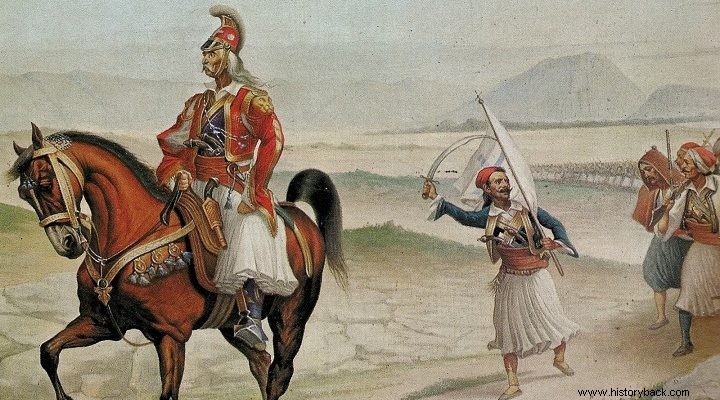
In 1825, after the landing of Ibrahim in the Peloponnese, the Greek Revolution was in full swing. But there was the Old Man of Moria, Theodoros Kolokotronis. Kolokotronis had been a thief since genofascia His He had seen his whole family fall by the Turk's knife. He himself had been hunted down and escaped from grace countless times. So he was not the man to bow his head, not to Ibrahim, but to anyone. Only before God did the Old Man reverently bow his venerable head.
So if the other Greeks had become cowards he remained steadfast and would do everything to make them warriors again. With great bitterness, but also determination, he did not hesitate to execute on the spot those who refused to take up arms. In this way he managed to gather forces. At Alonistaina, an Egyptian battalion, reinforced with a cavalry ulama, was surprised by the Greeks and was defeated. Ibrahim, however, responded with a wide encircling maneuver with 9,000 men, attempting to encircle and disperse the men of Kolokotronis in Alonistaina.
But the Old Man understood him and managed to retreat. He even answered Ibrahim with successful attacks on Piana and especially on Davia, where an Egyptian regiment was disbanded, leaving 500 dead, 200 muskets and his flags on the field. Ibrahim understood that the facts had changed. Not a day passed that Kolokotronis did not receive a "gift" of at least 50 Egyptian heads. The bearers of the heads were paid a coin for each.
Times were tough and required tough solutions. Warriors and shepherds, farmers, women and children beat the Egyptians wherever they found them. Ibrahim's supply became problematic. The mills where the Egyptians used to get flour were leveled. Ibrahim found himself in a difficult position for the first time. Trying to provoke Kolokotronis he sent him a letter in which he called him a coward. The Old Man replied haughtily:
"You can't play the lad by dragging the staffs and science of Europe with you so much. If you are really a lad, as you write to me, take as many men as you want, let me take as many others, and come let us make a just war. Or if you love again, come, your monk, you and my monk, let's be measured!
Ibrahim did not answer. After all, winter was coming. Ibrahim took advantage of the time and decided to reinforce Kiutahi Pasha who was besieging Messolonghi. Unfortunately Ibrahim was left to head unmolested towards Messolonghi. The Old Man knew, from captivity, Ibrahim's intentions and itinerary. So he asked the government to provide him with food and munitions to try to intercept him. Again he was not listened to. So Ibrahim passed, a little later, "unscathed" and reached Messolonghi, sealing the fate of the glorious city.
Tripolitsa
Kolokotronis then at least tried to take advantage of Ibrahim's absence to recapture Tripolitsa. this time his plan was accepted and the government even made sure to announce it through the press! "They put it in the papers" , says the Old Man bitterly in his memoirs, "they said that the general leader agreed with the government to give him zaire (food) and munitions to resalt Tripolitsa. and the papers came out before I was ready. Such secrecy they had. They were giving news to the enemy!" But the government was not satisfied with that. He also sent an envoy to Tripoli to ask the Turks to surrender because otherwise he would beat them!
So, naturally, when the attack was made by Niketar's lads, all the Turks and Egyptians were ready. "Until the women knew it and squealed before the resalto", writes the Old Man . Nikitaras did not insist on the raid. And Kolokotronis almost went down to Nafplio to "say it with the administration". But having in mind the bloody civil war, which had cost the life of his son Panos, he gave way to anger and returned to stealth warfare...
Whether the rulers at the time "betrayed" the attack out of sheer stupidity or purposefully so as not to glorify their enemy Kolokotronis is a matter of debate. Both are probably true, to a greater or lesser degree of each. What counts, however, is the result, and this was by no means positive for the Greeks. If then Kolokotronis liberated Tripolitsa again, Ibrahim could move on internal lines throughout the Peloponnese, depriving the enemy of this advantage and his main base of support for his operations. But the rulers at the time seem to have had other things in mind...
